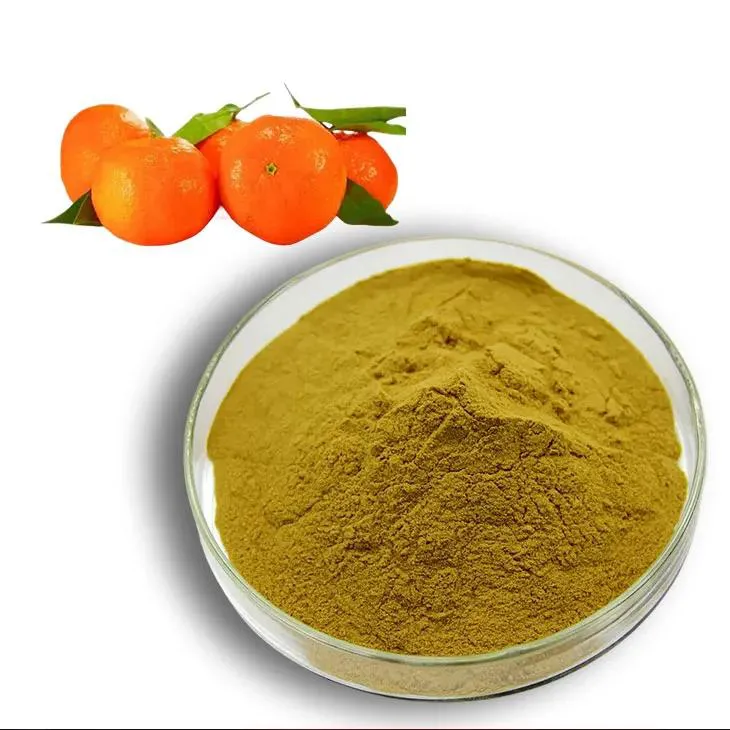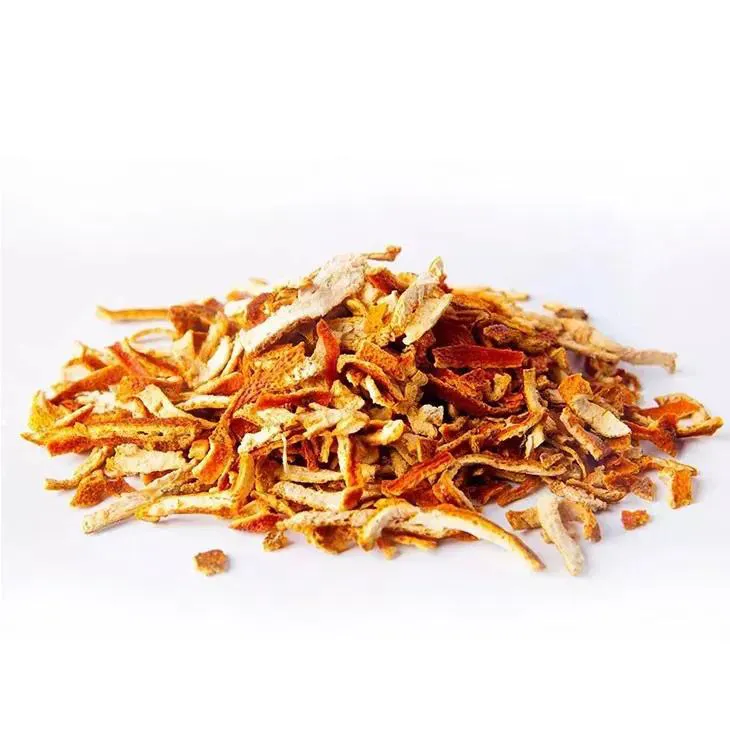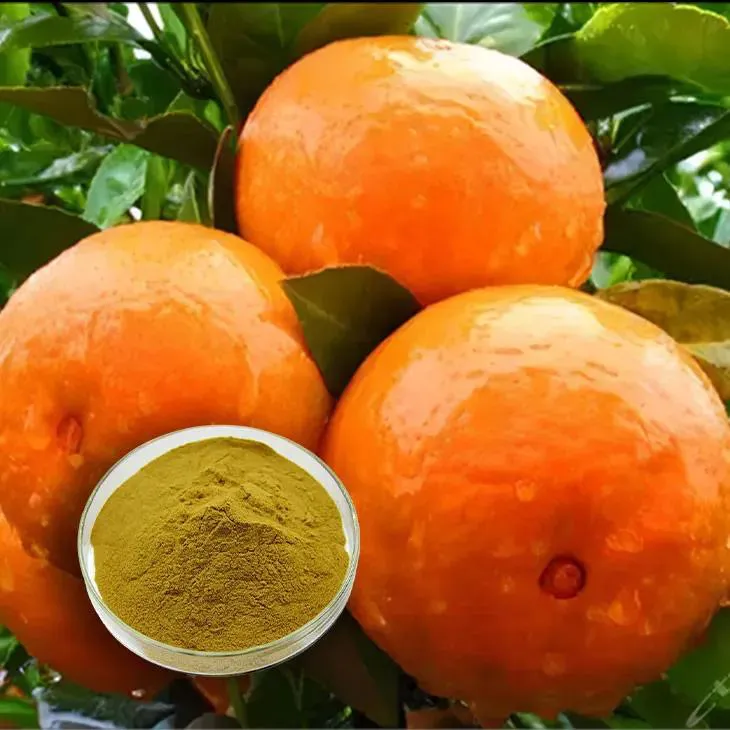- 0086-571-85302990
- sales@greenskybio.com
Citrus bioflavonoids
2024-11-13

1. Introduction to Citrus bioflavonoids
Citrus bioflavonoids are a diverse class of natural compounds that are richly present in citrus fruits such as oranges, lemons, grapefruits, and limes. These compounds are not only responsible for the vivid colors of citrus fruits but also hold significant importance in terms of human health. They are part of the polyphenol family and are known for their wide - ranging biological activities.

2. Antioxidant Properties
2.1 Free Radicals and Oxidative Stress
One of the most crucial aspects of Citrus bioflavonoids is their antioxidant properties. In the human body, free radicals are constantly being produced as a by - product of normal metabolic processes. However, an imbalance between the production of free radicals and the body's ability to neutralize them can lead to a state known as oxidative stress. Free radicals are highly reactive molecules that can damage cells, proteins, and DNA. This damage can accumulate over time and is associated with the development of numerous chronic diseases, including heart disease, cancer, and neurodegenerative disorders.2.2 How Bioflavonoids Combat Oxidative Stress
Citrus bioflavonoids act as powerful antioxidants by donating electrons to free radicals, thereby neutralizing them. This process helps to prevent the free radicals from causing oxidative damage to the body's cells and tissues. For example, flavonoids like Hesperidin and naringenin, which are commonly found in citrus fruits, have been shown to scavenge free radicals effectively. By reducing oxidative stress, citrus bioflavonoids play a significant role in maintaining overall health and preventing the onset of various diseases.
3. Benefits for the Immune System
3.1 Immune System Function
The immune system is the body's defense mechanism against pathogens such as bacteria, viruses, and fungi. A well - functioning immune system is essential for maintaining good health. Citrus bioflavonoids contribute to the enhancement of the immune system. They can stimulate the production and activity of immune cells, such as white blood cells. For instance, some bioflavonoids have been found to increase the activity of macrophages, which are cells that engulf and destroy foreign invaders in the body.3.2 Prevention of Infections
By strengthening the immune system, citrus bioflavonoids can help the body to better resist infections. This is particularly important during the cold and flu season or in situations where the body is exposed to a high number of pathogens. Consuming citrus fruits rich in bioflavonoids can be a natural way to boost the immune system and reduce the risk of getting sick.
4. Anti - Inflammatory Effects
4.1 Inflammation and its Consequences
Inflammation is a natural response of the body to injury or infection. However, chronic inflammation can be a problem as it is associated with various diseases, such as arthritis, diabetes, and cardiovascular diseases. Inflammatory processes involve the release of chemical mediators that can cause pain, swelling, and tissue damage.4.2 Role of Bioflavonoids in Reducing Inflammation
Citrus bioflavonoids have anti - inflammatory effects. They can inhibit the production of inflammatory mediators, thereby reducing inflammation in the body. For example, in the case of arthritis, bioflavonoids may help to relieve joint pain and swelling by reducing the inflammatory response in the affected joints. This makes them a potentially valuable natural remedy for inflammation - related disorders.5. Cardiovascular Health Benefits
5.1 Blood Pressure Regulation
Citrus bioflavonoids can have a positive impact on blood pressure regulation. Some studies have suggested that they may help to relax blood vessels, which in turn can lead to a reduction in blood pressure. By maintaining normal blood pressure levels, the risk of developing heart disease and stroke can be significantly reduced.5.2 Cholesterol Management
Another aspect of cardiovascular health is cholesterol management. Citrus bioflavonoids may help to improve cholesterol levels by reducing the levels of LDL (low - density lipoprotein) cholesterol, also known as "bad" cholesterol, and increasing the levels of HDL (high - density lipoprotein) cholesterol, or "good" cholesterol. This balance in cholesterol levels is crucial for maintaining a healthy heart.5.3 Anti - platelet Aggregation
Bioflavonoids can also inhibit platelet aggregation. Platelets are blood cells that play a role in blood clotting. Excessive platelet aggregation can lead to the formation of blood clots, which can block blood vessels and cause heart attacks or strokes. By preventing platelet aggregation, citrus bioflavonoids contribute to the prevention of cardiovascular events.6. Cancer - Preventive Potential
6.1 Role in Cell Signaling
Citrus bioflavonoids may play a role in cancer prevention through their influence on cell signaling pathways. They can interfere with the signals that promote cell growth and division in cancer cells. By disrupting these abnormal cell signaling processes, bioflavonoids may help to prevent the development and progression of cancer.6.2 Antioxidant - related Cancer Prevention
As mentioned earlier, their antioxidant properties also contribute to cancer prevention. Oxidative damage to DNA can lead to mutations that may initiate cancer. By neutralizing free radicals and reducing oxidative stress, citrus bioflavonoids can help to protect DNA from damage and thus reduce the risk of cancer development.7. Dietary Sources of Citrus Bioflavonoids
7.1 Citrus Fruits
The primary source of citrus bioflavonoids is, of course, citrus fruits. Oranges are a well - known source, containing bioflavonoids such as Hesperidin. Lemons are rich in eriocitrin, and grapefruits contain naringenin. These fruits can be consumed fresh, juiced, or used in various culinary preparations.7.2 Citrus - based Products
In addition to whole fruits, citrus - based products also contain bioflavonoids. Citrus juices, whether freshly squeezed or commercially processed (although freshly squeezed juices may retain more bioflavonoids), are a convenient way to obtain these compounds. Citrus peel extracts are also used in some dietary supplements, as the peel often contains a high concentration of bioflavonoids. However, it is important to note that when using supplements, one should ensure their safety and quality.8. Absorption and Bioavailability
8.1 Factors Affecting Absorption
The absorption of citrus bioflavonoids in the body can be influenced by several factors. One important factor is the form in which the bioflavonoids are consumed. For example, some forms may be more easily absorbed than others. Additionally, the presence of other food components in the diet can affect absorption. For instance, dietary fiber may interact with bioflavonoids and impact their absorption.8.2 Bioavailability in the Body
Once absorbed, the bioavailability of citrus bioflavonoids in the body also varies. Some bioflavonoids may be metabolized more quickly or efficiently than others. The liver plays a significant role in metabolizing these compounds, and the metabolites may have different biological activities compared to the original bioflavonoids. Understanding the absorption and bioavailability of citrus bioflavonoids is important for determining the optimal ways to consume them to achieve maximum health benefits.9. Safety and Precautions
9.1 General Safety
Citrus bioflavonoids are generally considered safe when consumed in normal amounts through dietary sources. However, as with any natural compound, excessive consumption may have potential risks. For example, in some cases, high - dose supplements may cause gastrointestinal discomfort or interact with medications.9.2 Interactions with Medications
Some citrus bioflavonoids may interact with certain medications. For instance, they may affect the metabolism of drugs in the liver, potentially altering their effectiveness or increasing the risk of side effects. It is important for individuals taking medications, especially those metabolized in the liver, to consult their healthcare provider before taking citrus bioflavonoid supplements.10. Conclusion
Citrus bioflavonoids are a remarkable group of natural compounds with a wide range of health benefits. Their antioxidant, immune - enhancing, anti - inflammatory, and disease - preventive properties make them a valuable addition to a healthy diet. While citrus fruits are a natural and delicious source of these bioflavonoids, it is also important to be aware of the safety aspects, especially when considering supplements. By incorporating citrus fruits and their products into our diet in a balanced way, we can take advantage of the many benefits that citrus bioflavonoids have to offer for our overall health and well - being.
FAQ:
What are citrus bioflavonoids?
Citrus bioflavonoids are natural compounds that are plentiful in citrus fruits.
What health benefits do citrus bioflavonoids offer?
They offer multiple health benefits. They have antioxidant properties to combat oxidative stress by neutralizing free radicals, which helps prevent chronic diseases like heart disease and some cancers. They also improve the immune system and have anti - inflammatory effects for reducing inflammation - related disorders such as arthritis.
How do citrus bioflavonoids help prevent chronic diseases?
They possess antioxidant properties. These antioxidants neutralize free radicals in the body, thus combating oxidative stress which is associated with the development of chronic diseases such as heart disease and certain cancers.
How do citrus bioflavonoids affect the immune system?
Citrus bioflavonoids contribute to the improvement of the immune system, enhancing the body's defense mechanisms against pathogens.
Can citrus bioflavonoids help with arthritis?
Yes, they can. Citrus bioflavonoids have anti - inflammatory effects, which can be beneficial for reducing inflammation - related disorders such as arthritis.
Related literature
- The Role of Citrus Bioflavonoids in Health and Disease"
- "Citrus Bioflavonoids: Sources, Bioavailability, and Potential Health Benefits"
- "Bioflavonoids from Citrus Fruits: A Review of Their Antioxidant and Anti - Inflammatory Properties"
- ▶ Hesperidin
- ▶ citrus bioflavonoids
- ▶ plant extract
- ▶ lycopene
- ▶ Diosmin
- ▶ Grape seed extract
- ▶ Sea buckthorn Juice Powder
- ▶ Beetroot powder
- ▶ Hops Extract
- ▶ Artichoke Extract
- ▶ Reishi mushroom extract
- ▶ Astaxanthin
- ▶ Green Tea Extract
- ▶ Curcumin Extract
- ▶ Horse Chestnut Extract
- ▶ Other Problems
- ▶ Boswellia Serrata Extract
- ▶ Resveratrol Extract
- ▶ Marigold Extract
- ▶ Grape Leaf Extract
- ▶ blog3
- ▶ blog4
- ▶ blog5
-
Organic Tongkat Ali extract powder factory.
2024-11-13
-
How to make powder with ashwagandha extract.
2024-11-13
-
Rosehip extract manufacturers from China.
2024-11-13
-
The best cat's claw extract in nature.
2024-11-13
-
Chinese Dandelion Leaf Extract Suppliers.
2024-11-13
-
Kupilu Extract
2024-11-13
-
Tongkat Ali Extract
2024-11-13
-
Licorice Root Extract Powder
2024-11-13
-
Chia Seed Powder
2024-11-13
-
Almond Extract Powder
2024-11-13
-
Citrus Aurantii Extract
2024-11-13
-
Shikonin
2024-11-13
-
Hawthorn Extract
2024-11-13
-
Saffron Extract Powder
2024-11-13
-
Chaste Berry Extract
2024-11-13





















